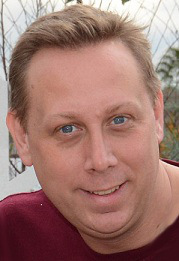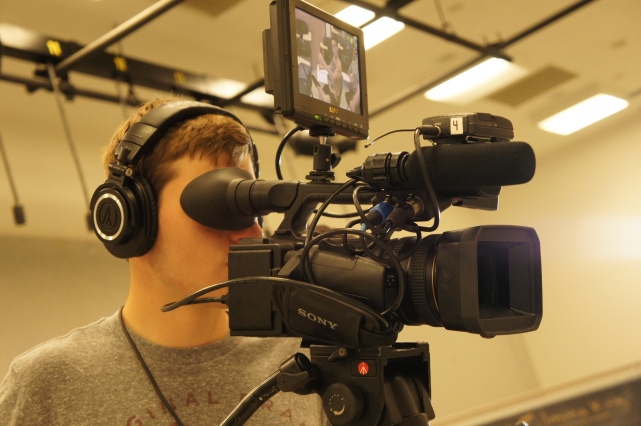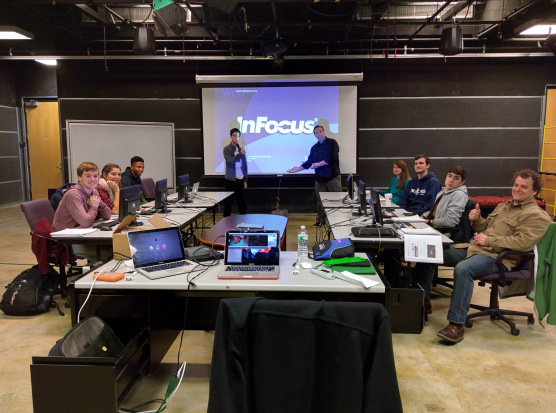Since the Rutgers Digital Filmmaking Academy starts February 11, 2016, we continue with our Weekly Faculty Interview series with the Program Director of the Rutgers Digital Filmmaking Academy, the AVID Media Intensive, and the Rutgers Summer Filmmaking Camp, Neal Bennett!
 Neal Bennett is a multi JASPER & Telly Award- winning producer, director, editor, and filmmaker with two decades of experience and ten years of teaching experience. Over the years he has worked on ESPN’s World Series of Poker, MLB Network’s World Series, HBO’s Real Sports, various NHL Productions with Boardwalk Productions, NFL Films, YES Network’s Yankees on Deck, TLC’s Trading Spaces, and Assignment Discovery. His feature film experience includes Kevin Smith’s Chasing Amy with Ben Affleck, Eric Mendelsohn’s Judy Berlin with Edie Falco, Craig Singer’s Animal Room with Neil Patrick Harris, the short film TAT, as well as his own independent feature film, Love from the Machine.
Neal Bennett is a multi JASPER & Telly Award- winning producer, director, editor, and filmmaker with two decades of experience and ten years of teaching experience. Over the years he has worked on ESPN’s World Series of Poker, MLB Network’s World Series, HBO’s Real Sports, various NHL Productions with Boardwalk Productions, NFL Films, YES Network’s Yankees on Deck, TLC’s Trading Spaces, and Assignment Discovery. His feature film experience includes Kevin Smith’s Chasing Amy with Ben Affleck, Eric Mendelsohn’s Judy Berlin with Edie Falco, Craig Singer’s Animal Room with Neil Patrick Harris, the short film TAT, as well as his own independent feature film, Love from the Machine.
As the President and Director of Education for the non-profit Industry Media Arts, he realizes it’s necessary for students to learn by having industry related real-world experiences. On top of his work with the Mason Gross Extension Division, Bennett currently instructs at the Mason Gross School of the Arts in the new Rutgers Center for Digital Filmmaking BFA program.
TJ: What initially inspired you to go into the arts?
NB: I never really thought of it as “the arts”. I wanted to work on movies ever since I was a little kid. Either that or jump out of a plane and be a paratrooper. I think my parents thought it was safer to work in the movie business. Not sure which is more dangerous. Throughout high school, my friends and I started shooting short skits on my VHS camera I bought from Sears in the late 80’s. We were allowed to screen the final video to the senior class and after that I was hooked. During college I worked on my first feature film with Neil Patrick Harris, Amanda Peet, Matthew Lillard, and the Misfits.
From there I went to work on music videos for CMT then Chasing Amy before graduating college. I guess it’s the rush you get working with such great talent in front of and behind the camera creating new content for an audience that inspires me to stay in this crazy business.
TJ: Was there a teacher or filmmaker who made an impact upon your development as an artist? How did they impact your own work as a teacher/filmmaker?
NB: Of course there are a group of amazing directors, cinematographers and editors out there that do amazing work. I try to deconstruct their work and emulate their process on my own sets. But in real life, the directors, cinematographers, and editors I work with are my teachers. They are the ones that consistently make an impact on me during and after each shoot. I’m always learning something new on a technical and aesthetic level working with some of the top professionals in this business.
TJ: What is the most rewarding part of teaching for you?
NB: The most rewarding part of teaching is seeing my students move on to working in the real world and being successful in various areas of this industry. Former students of mine work in post-production for the Weinstein Company; others are working for Sony Pictures & Fox Searchlight. Other students have gone on to work with directors as personal assistants, production managers, supervising producers, sound mixers, cinematographers, and even own their own production companies. Some of the other rewarding aspects of teaching is having students call you down the road and bring you in on their projects.

TJ: Which member of the film crew do you feel is most overlooked?
NB: It’s hard to say because there are so may people involved in making feature film or TV show. Most people get up after watching a film and don’t’ bother to watch the credits. So I’d say everyone on this list is often overlooked.
From a teachers perspective working with small student crews, I think the lighting and sound departments of the production are most often overlooked. The importance of these two departments are usually also overlooked when teachers or departments in a school put a program together. I see this in the high school and college level. Even on small professional projects. They want to hire the camera operator, but there’s no budget for lighting or sound.
TJ: What was the best project or film you have ever worked on? Why?
NB: There have been a lot of amazing projects I’ve had the opportunity to work on, but looking back I’d have to say TLC’s Trading Spaces was the most fun. I’m still in touch with a lot of the crew. Not only were they a great crew, but they are great people.
TJ: Do you have any advice for young artists looking to go into filmmaking or editing? What is something they should know about the film industry?
NB: My advice is to get involved as young as possible. Start writing and creating content. Develop a workflow and get a group of creative people together. Develop a team you can work with and rely on. Read articles in trade magazines to keep up with the industry. Check out StudentFilmmakers.com.
TJ: Bonus Question: Thoughts about the latest Star Wars movie?
NB: I was lucky enough to see The Empire Strikes Back and Return of the Jedi in theaters when they were released. It was amazing. After seeing the last 3 that were made, I didn’t have high expectations for this latest film, even though J.J. Abrams was producing and directing. But I have to say I really enjoyed the film. I think some things moved a little too fast and really didn’t get a chance to develop, but overall I had fun.
The best part was being able to share this experience with my kids. My son is the same age I was when I first saw The Empire Strikes Back. So that added to the experience. His favorite character is BB-8. Mine was R2-D2. Our plan is to build our own life-sized droids. R2 has a lot more parts, but BB-8 looks to be more challenging. I’m calling on some former film students-turned-engineers to assist. I’ll keep you posted.
Thanks Neal! If you would like to know more about the Rutgers Digital Filmmaking Academy, Rutgers Summer Filmmaking Camp, or the AVID Media Intensive, please visit mgedfilm.wordpress.com!
The Rutgers Digital Filmmaking Academy & The Rutgers Summer Filmmaking Camp both feature a comprehensive curriculum that allow participants the opportunity to focus on various areas of interest. The purpose of these programs is to introduce students to industry standards of filmmaking; a solid foundation in the core concepts and principles of filmmaking will be stressed. Focusing on the importance of organization and experimentation within the filmmaking process will allow students to expand their creativity while giving them a solid foundation and a working knowledge of project management.
AVID Media Composer 101 Editing Essentials is the first step in achieving confidence, creativity, and efficiency with Avid Media Composer, the non-linear film and video editing application used in most movie and television productions. Along with its counterpart, Media Composer 110 Effects Essentials, AVid Media Composer provides the foundation for Media Composer User Certification.
AVID Media Composer 110 Effects Essentials is for video editors who understand the basics of the editing tools in Media Composer and are ready to move ahead and learn the fundamentals of creating effects within Avid Media Composer, the non-linear film and video editing application used in most movie and television productions. This course provides a solid foundation in Media Composer audio and video effects capabilities and, in conjunction with MC101 Editing Essentials course, will prepare you for Avid’s User Level Certification in Media Composer.
